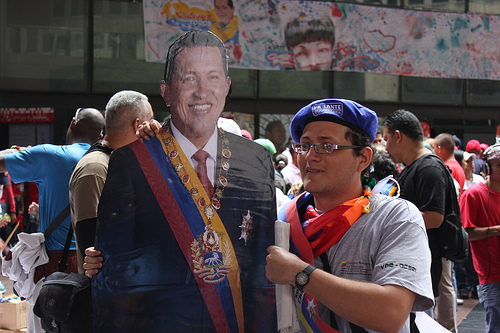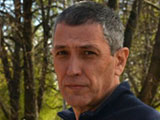Notes on Venezuela
by Israel Centeno and translated by Alex Higson / October 10, 2013 / No comments
Political myth-making in Caracas.

For people in other countries, a lot of things in Venezuela are hard to understand. For example, before Chávez, Venezuela was a modern country and despite mistakes that can be attributed to the institutional democracy we had at that time, we had free healthcare and education and social policies that endured for forty years. Where, if not here, were the members of the current revolution looked after and educated? Who gave them positions in universities and made them part of the national project? We were not a perfect country, but neither were we a heartless nation at odds with reality. Venezuela was a meeting point, a great place for all who had to leave their countries as a result of persecution from many kinds of authoritarianism. It was also a supporter of democratization in the region, including in Somoza’s Nicaragua and in Pinochet’s Chile.

- From his lonely watch post Albert Camus asked who among us has not experienced exile yet still managed to preserve a spark of fire in their soul. “We’re all alone,” Natalia Sedova cried in exile on hearing of her husband Leon Trotsky’s affair with Frida Kahlo. In his novel Night Watch, Stephen Koch follows the incestuous love affair of David and Harriet, wealthy siblings watching the world from their solitary exile. Koch’s writing, Camus’s theories, and Trotsky’s affair all come back to exile and lead me to reflect on the human condition. From my own vantage point, my Night Watch, I will reflect on my questions of exile, writing, and the human condition.

- Israel Centeno was born in 1958 in Caracas, Venezuela, and currently lives in Pittsburgh as a Writer-in-Residence with City of Asylum/Pittsburgh. He writes both novels and short stories, and also works as an editor and professor of literature. He has published nine books in Venezuela and three in Spain.
But for the last fifteen years there has been a key function, a state policy, a sustained strategy: Fracture logic, make it impossible to establish the facts, make empirical truths disappear from objective sources. Is there a difference between the candidate who always sat at his table with an empty chair for the ghost of Simón Bolívar, and the candidate who has become a kind of syncretic St. Francis of Assisi, communicating with his gods through the birds and the butterflies, the actant and folkloric nature of the most picturesque national imagination? No, there isn’t. Maduro invokes Chávez and sees his hand in whatever is most convenient, conjuring him in front of his audience, just as Chávez used to invoke Bolívar. And everyone—both his supporters and the opposition—instantly becomes an echo of his mystical red glow, even if with this comes mockery, baloney, or fanaticism. As Venezuela’s social and political fabric begins to decompose, this becomes a legitimating phenomenon of the narrow father–son relationship. The struggle in Venezuela has followed the routes of its ancestral and religious legacies. Now it also follows the legacy of its mafioso leaders.
Religiosity occupies the place that should belong to political reason. “Chavismo” has worked hard to become a religious movement that demands of its followers mysticism, faith, and intolerance of anything or anyone that questions the truth it claims to embody. At first Chávez was the voice of Bolívar on earth, a messiah, a savior. In doing so he used and abused the syncretic symbolism of Venezuelan religiosity. And even as an ill man, he worked towards his own deification, his postmortem glory. The lieutenant-colonel’s great triumph is to have rendered impossible any departure from or alternative to his project. In this he left room only for a narcoreligious scenario in which acts of faith and loyalty are more highly prized than any kind of political reasoning. Chávez has become a mob crusade for truth, with all the exclusive emotional baggage that comes with it. His legacy is so pervasive that if we attempt to analyze the most recent electoral campaigns, we find in the candidates a predominance of religious and mafioso symbology that far outweighs their promises. In the past fifteen years a profound Venezuela has risen to the surface with all its prejudices and nineteenth-century symbols: Caste rather than class hatred, urban guerrilla epics, and archaic terminology. Of course none of this is by coincidence. It all has a design, a political design, that has been imposed by the operators of the Fidelist Left and a consistent global “philofidelism.” To this we should add the country’s geopolitical plays, including the issue of drug trafficking—to apply Colombian themes to Venezuela—as well as drug-related guerrilla warfare, which has formed collective states within the State, making insecurity a State policy, a matter that forces the country to walk on the edge of an outlawed structure.
Chávez’s glory came at a high cost. But time will pass, and even if his people make mistakes and are accused of wrongdoing, he will remain unpolluted, sitting high on the altar of eternal adolescence or archaic romantic thought. He will be one of those figures who embody the epic rebellion of the oppressed. While we continue battling with premodernity, he will be present as a myth: An unreachable utopia, either because he has been betrayed or because he has been the victim of corporations and empires, of universal capital, etc. Together with Saint Evita and El Che, there will be Chávez, serving as a standard-bearer for those who, in the name of the Earth’s poor, try to obtain power with the very personal aim of revolutionary glory. On the other hand, nobody has bothered to give form to his moral, rather than bodily, corruption. Chávez leaves a family and a number of friends, but not his people, with imponderable material riches. And Maduro is no coincidence, but rather a sad consequence of Chávez’s policies. Who will carry out the investigation that desecrates the saint?
Maduro is a man formed in the shadows of Chávez and Castro. However, I believe that he has a limit and doesn’t view himself as a romantic figure; he cannot change paradigms. He is trying to sustain a legacy and consolidate a model, but ultimately he will respond to Cuba’s geopolitical dynamic.
Economic crisis, shortages and inflation, inefficiency. What else have these revolutions embodied as real socialism achieved? Repression, intolerance, incapacity, scarcity.
In contrast with Cuba, which always had to seek economic sponsorship—for example, from the former Soviet Union—Venezuela has huge economic resources and reserves, which, up until now, have been capable of buying international legitimacy for a dictatorship enshrined in democratic guises. There is a new term for this: Democraship.
Our petroleum and gasoline, our strategic reserves, continue to be handed over punctually and with eagerness to all the interests of international capital.




